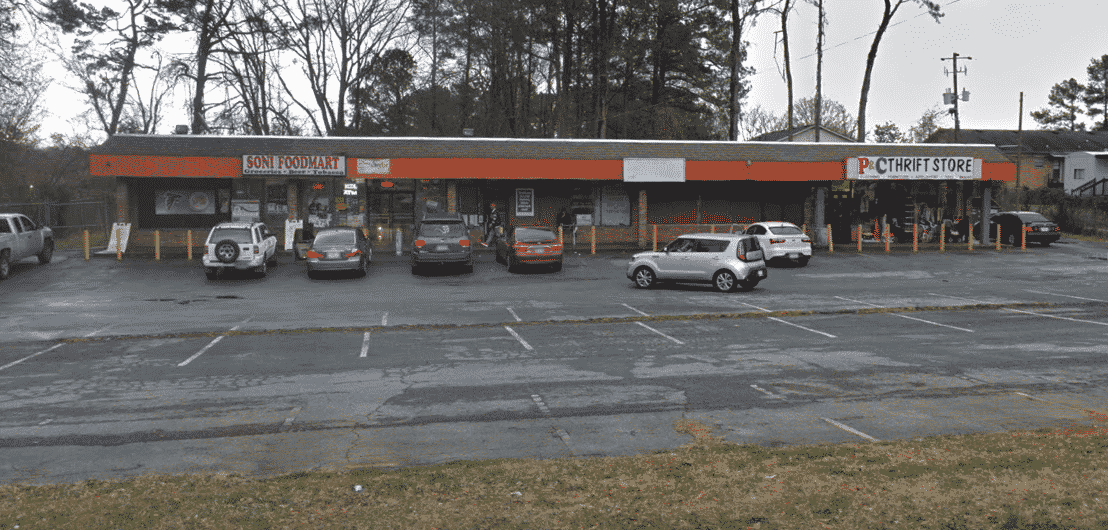The Story:
On the evening of February 3, 2019, our clients’ father, TN, went to a convenience store in DeKalb County, Georgia. Video surveillance showed TN hanging outside the store talking to other people for a period of several minutes. TN then sat down on the curb outside the store.
While TN was sitting there, he seemed to exchange words with a man we later found out was named Michael Hill. After talking to TN, Hill entered the store and began to walk around. It was not obvious why Hill was at the store—he just paced around the store for some time without buying anything.
Hill eventually bought a beer and continued to pace around the store as he drank it. Hill appeared to have free access to the back areas of the store that were not available to most customers. From this it seemed Hill had some type of a relationship with the store’s employees.
Surveillance video also showed a group of men drinking and smoking inside the store, even though the convenience store did not have an on-premises liquor license.
Another man entered the store and spoke to Hill. The man then left the store with Hill. As Hill exited the store, he pulled out a gun and shot TN, hitting him 3 times in the torso. Hill and his accomplice fled the scene. Police responded to the gunfire and found TN dead at the scene.
Michael Hill was arrested five months later in Indianapolis, Indiana, and he is currently charged with murder.
Our Investigation:
Evidence can disappear quickly when someone is killed at a business. The same day Rafi Law Firm got the case, we went to the convenience store to investigate. When we visited the store, we saw several people loitering outside—they scattered when they saw a professional-looking person in a suit walk toward the entrance.
Once we were inside the store, we immediately noticed people drinking and smoking. There were also people huddled around a few video gambling machines. We attempted to interview store employees, but none of them wanted to talk about the shooting. The customers—some of whom appeared to be regulars—were similarly tight-lipped. We took some photographs and got out of there.
Within the next few days, we tracked down and interviewed the homicide detective who was investigating TN’s murder. The detective explained to us that the convenience store was a hangout for drug dealers and buyers. The detective said when he visited the store, he saw the same thing we did: people were hanging out more than they were buying things. He also told us Hill was a regular who hung out at the store and sold drugs.
We needed to obtain the surveillance video. We contacted local news stations who had reported on the story and asked them for any videos they had obtained. They balked at our request, telling us they would not provide the video without a subpoena. Since we were still investigating and had not filed a lawsuit, we could not send them a subpoena, so we had to get the video a different way. We were able to leverage our relationship with local police in order to obtain the surveillance video. Although police generally do not provide evidence from open investigations, they gave us the video anyway.
The information we learned from the detective and our ability to get the security footage highlights an important truth about working crime-related cases: attorneys need to forge great relationships with the police so they can benefit from police investigations, like we did in this case.
In addition to investigating the shooting itself, we investigated the history of crime at the convenience store. In order to recover against a property owner/manager like this one for failing to protect people from crime, injured people (the family of TN, in this case) must prove the owner/manager was on notice of substantially similar activity before the incident. We used Georgia’s Open Records laws to help us do just that.
We obtained 911 calls made from the store and a crime grid showing all the police reports related to incidents there. And we used the crime grid to obtain report after report of substantially similar violent crime on the premises. We were thorough. We used the same process to investigate a nearby apartment complex, just in case the convenience store’s name would pop up in those reports.
Using the 911 records and police reports, we discovered that, in the 3 years prior to TN’s death, police had created reports for the following incidents at the convenience store:
- 3 shootings
- 3 armed robberies
- 2 stabbings
- 2 strong-arm robberies
We also learned that, in those same 3 years, concerned citizens had called in:
- 2 people shot
- 1 person stabbed
- 2 armed persons
- 1 armed robbery
- 1 firearm discharge
- 4 assaults
Mediation
We targeted both the store owner and the landowner. Once we told their lawyers how our investigation was going, they asked to mediate the case with us, meaning they were willing to offer money to settle without a lawsuit.
At mediation, we presented key video clips of Michael Hill loitering and drinking inside. We explained that allowing drinking, smoking, and gambling on premises invites criminal behavior. We showed the defense attorneys the gambling machines and the bulletproof glass that had been installed at the store. We argued the bulletproof glass was evidence the people who owned the building and the people who ran the store knew the convenience store was a dangerous place.
We gave the defense the statistics regarding prior crimes at the convenience store, but we went a step beyond that, because we would have to prove the store owners and operators were on notice of the crimes if the case were to go to trial. We had collected hundreds of police reports, but we boiled them down to a handful of statements from those reports to show just how dangerous the convenience store was. We showed them reports from other shootings and stabbings. We showed them reports showing law enforcement’s observation that the store is “notorious” for drug activity. We showed them a report from when the store owner’s vehicle was shot up in the parking lot. During our presentation, we left no doubt that the store owners were on notice of dangerous crime on the premises. Here are some examples:
Shooting
Shooting
Shooting
Armed robbery with a gun
Gun incident
Gun incident
Stabbing
Incident involving drugs and guns
Drug incident
Drug incident
Drug incident
Drug incident
Drug incident
We also explained all the things that could have been done by the defendants to prevent TN’s death.
TN was an admirable man who worked in churches performing music for a living. His death was obviously devastating to his 5 children. We provided impact statements from each of TN’s children—they lived out of state but trusted us to make the case at mediation for them.
The Settlement:
After we gave our persuasive presentation, the defendants were eager to settle the case for a generous amount. In fact, the 2 insurance companies spent most of the mediation arguing over who would pay our clients more.
Thanks to our fast and thorough investigation, we were able to obtain this excellent settlement just 6 months after TN was killed, and we did not have to file a lawsuit to do it. Of course, we showed the defense that we’d already had a lot of success resolving shooting cases against premises owners and operators, and we believe our reputation made a difference. The insurance companies knew that if they failed to settle within the defendants’ policy limits, there was a very good chance we would go to trial and obtain a verdict that was greater than the limits.
This result is particularly remarkable in light of all the bad facts in the case. It’s not entirely clear TN had any business being at the convenience store that night, because the video only shows him loitering outside. TN’s verbal altercation with Hill prior to the shooting also could have been harmful to the case. Hill was caught, meaning he could have been brought to trial and the defense could have argued that he deserved all the blame for killing TN, not the store. Still, the defense attorneys knew our arguments would likely lead a jury to allocate a large percentage of fault to defendants.
We are proud to have represented TN’s family, although truthfully, we wish this never happened in the first place and TN was still playing music at church. We are continuing to monitor the criminal trial of Michael Hill and helping TN’s family with anything they need.
















